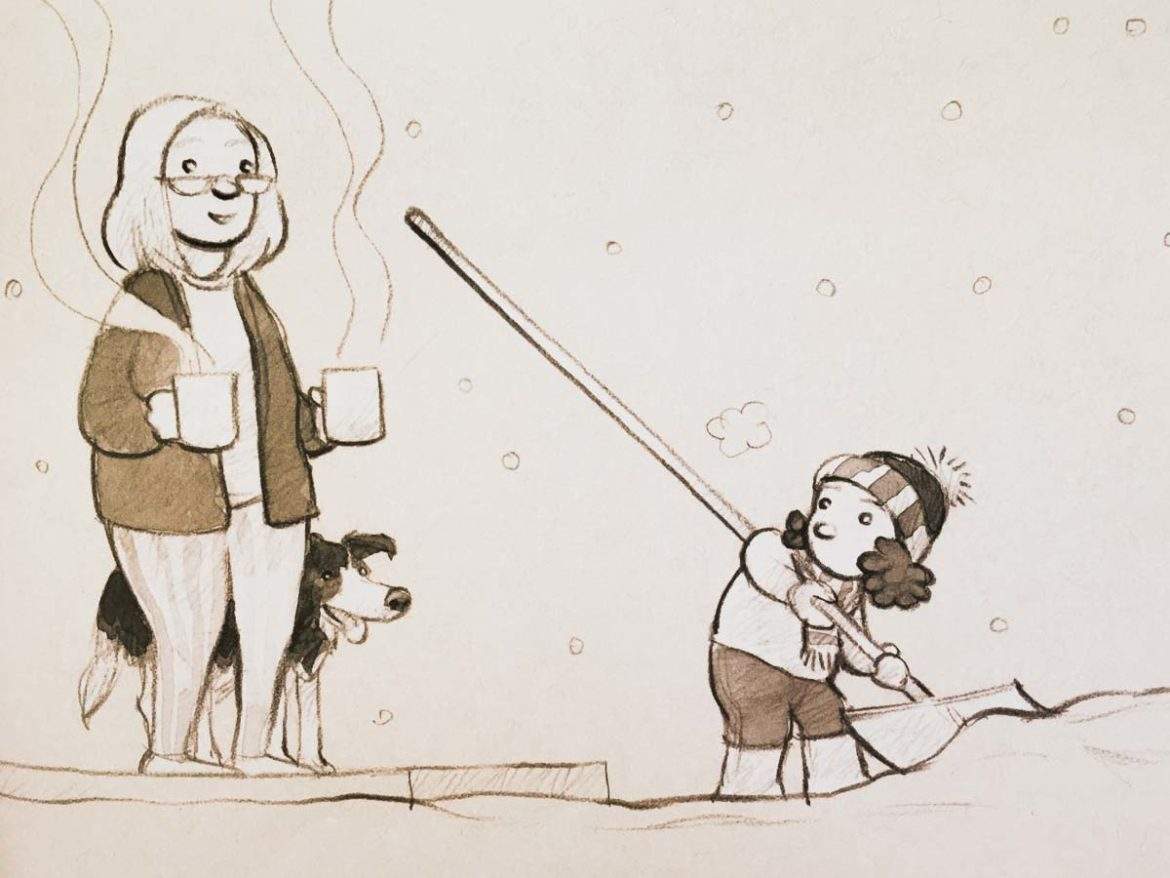[Image: Illustration from ‘The Girl And The Bicycle’ by Mark Pett. A young girl shoveling snow looks over to find the neighbor who hired her has brought two steaming mugs of hot cocoa for them to enjoy together.]
Below, find recommended reading & discussion questions to engage your kiddos in discussions on interdependence. After that, I’m gonna explain why you should care and (for those not already doing the work), how to get your ass in gear using these concepts to dismantle the kyriarchy.
First, a book list so you can discuss interdependence with your kiddos:
Many of these are a twist on those basic sharing & generosity books you can pick up anywhere. Unlike the basics, these focus on non-transactional kindness and healthy interdependence.
None of that garbage about the Golden Rule! The golden rule SUCKS. The concept of treating others the way we want to be treated is fundamentally flawed. This is the foundation of colorblind fallacy, tone policing, saviorism, and anti-equity conservatism. It’s a nice shortcut that excuses assumptions and skips over the hard part (listening and believing marginalized people.)
Treat people the way they want to be treated. We are not all the same! We all have different needs, challenges, and desires. Better idea: Teach kids that if they want to help someone, they should start by listening to them. And then they should go do what that person asks them to do.
Right! On to the books!
Raising Luminaries is free and accessible for readers who can’t afford a paywall. Posts may contain affiliate links, which allow me to earn a commission at no extra cost to you. Check out the full affiliate disclosure along with my statement of accountability. If you’re into supporting libraries (please do!) more than consumerism, you can also support my work directly:
Donate or shop using an affiliate link via| Paypal | Venmo | Ko-fi | Buy a t-shirt | Buy a book
-
Ana Hibiscus (chapter 1)
-
The Boy Who Loved Math – I have a longer article on this book: That’s over here
-
Greet the Dawn (Nelson)
-
When you need a friend (Chiew)
-
Winter candle (Ashford)
-
The Apple (Bruna)
-
A Snake in the House & Mouse & Tim & The Lady & the Spider (these Faith McNulty books are all basically the same premise)
-
The Perfect Orange – although problematic for consent, as the female protagonist refuses reciprocation and a man ignores her.
-
I also have just a ton of books about transactionalism & radical kindness over in the FB group archives.
-
Also check out: the BFL book list for community & sustainable farming
-
Later on, I’ve got another book collection about intergenerational friendships, mutually-reliant and helpful friendships between equals. So stay tuned for that for whenever that shows up (it will be a while).
Discussions while reading:
-
How does it make X feel to give or help Y?
-
Have you ever helped like X? How did it make you feel?
-
Have you ever received like Y? How did it make you feel?
-
Why did X help Y?
-
Do you think X expects anything in return?
-
How would X feel if they thought Y felt obligated to return the favor?
-
Why was it easier for X to do this, not so easy for Y?
-
What kinds of things do you think are easier for Y that X can’t do?
-
What things are easy for us to give or help with, but harder for others?
-
Why do you think that is easier for you?
-
What could change that would make this harder for you?
-
Why did X have to work so hard to accomplish this?
-
What did X misunderstand about Y?
-
What did Y misunderstand about X?
-
What could they have said to each other beforehand to make things easier for both of them?
- Why does Y seem reluctant to ask for or accept help?
- What could X do to make it easier or reassure Y?
-
Identify what we need help with
-
Figure out what a new helper can handle, versus which things only we know how to deal with
-
Give a helper the necessary background information and training – resources, schedule, important details, and all the invisible stuff they’d need to pick up before tacking the task at hand.*
-
Find time and mental bandwidth to figure out all the stuff above, task it to the right people, worry about if we’re asking too much, worry about the social/emotional debts this might incur (see the first discussion question), and oversee them while they learn how to do it
-
Deal with the fallout if the helper bails, fails, or resents us for asking
This year, my partner is taking over finding childcare for summer break. I typed up a ten-page document on our options, pointed out all the things we need to consider. We can only afford some camp. Putting the kids in the wrong camp could be a mistake that financially ruins us, opens them up to sexual assault, and exposes them to ableist & racist camp councillors! Some camps accept kids with disabilities, but they get sick of our kids after a week, so we have to pull them in and out to give the councillors a break – but also minimize transitions for our kid who melts down with transitions. Some camps say they accept kids with disabilities but it turns out they don’t actually know what inclusion means, and they and kick us out with no refunds and no backup plans. The camps we can afford have to be reserved at 4:15am on this one particular Wednesday morning because those camps fill up within 5 minutes and the price hikes up if you wait.
-
What happenedbefore the story started?
-
Who do you think helped X before, so they are now in a position to help now?
-
Do you think X ate breakfast that morning? Who made it?
-
Who is watching X’s kids right now?
-
Who is caring for their aging parents?
-
How did they come to live there?
-
Who made the thing they are sharing?
-
Who taught them to share?
-
Did X ask for help at a good time?
-
Would it have been easier for Y to help if X had asked before the big disaster?
-
What does X find challenging?
-
Do you think X deserves less love / happiness / human rights because they can’t do this thing?
-
Do you think Y likes X less because of what X can’t do?
-
If so – would you want a friend like Y?
-
If [real person your kid loves] couldn’t do that too, would you love them less?
-
Why is X having a hard time admitting they can’t do this by themself?
-
What are they worried will happen?
Beyond books: Taking Action
Knowledge
Urgency
Capability
Interdependence is a skill we’re still practicing with the little Earthquakes.
-
Listen to what other folks need.
You want stuff, and that’s okay. But unless you’re on fire or bleeding, that has to wait. Shut up a moment and pay attention to what other people are saying. -
Try on a little humility.
Search for your own weak spots. Admit what is challenging for you. Even (especially) when it means people won’t like you anymore.You can’t do that until you listen because how will you know what you suck at unless you see someone excelling at it?
Looking people in the eye, for example. Before I knew I was autistic, I thought it was hard for everyone. Everyone had to deal with that hassle, they were just better than me at hiding their discomfort. Turns out, looking in eyeballs isn’t even a conscious decision for allistic people in white culture. They like it.
Now that I know it’s a strength for others, I can tell that it’s a weakness of mine. Looking at eyeballs while also listening to people! No offense, but that’s a weird skill! So for all of your emotional eyeball connection needs, I am not your go-to person. I need to rely on other people to handle parts of my life that involve eyeball gazing.
-
Try on a little arrogance.
Figure out what comes easy to you, and tell people about it.
You don’t need to be way, way far ahead of everyone. You don’t need to know ALL the stuff they know, plus more. You just need to know or be able to do, or even just want to do… like, maybe 1-2 things some folks can’t or don’t want to do.That’s the stuff you can offer! That’s what people can rely on you for!At age 5, R2 is, umm…perceives himself to be an expert at sorting laundry. That’s his job. (He’ll get better at it). We can depend on him to do it. One day, this will save me time, which I can spend on other things (that are not sorting laundry or looking at peoples’ eyeballs.) That’s his skill. And he’s going to be a great person to rely on for our laundry needs one day.
-
Be honest and visible.
All the stuff you discovered in parts 1-3. Talk about them. Be clear about them. Tell folks about them. This part is hard, if you’re already overwhelmed. All of my time spent trying to do all of that, but also I need to make time to generate a list of things people can do to help me? I told you, I’m new to this!
-
Be aware of your power.
‘Asking’ is a loaded term. If you have power over someone who has been conditioned to comply with authority, and you ’ask’ them to do something, that’s not a request. It’s a demand – a confusing one, disguised to gaslight the people you have power over.I catch my partner saying to the kids “Guys, can you please put your shoes on so we can leave for the bus?” That is frustrating. He’s phrasing it as a suggestion, but those shoes MUST go on, RIGHT NOW and they don’t really have a choice. It’s not a request, and he gets angry and flustered when they treat it like one.It’d be much cleaner, and kinder, to just phrase a demand as what it is. “Put your shoes on now.” The kids respond better to that. I respond better to that. Don’t try to win nice-guy points by pretending your power doesn’t exist. If you need to make a demand, own it.(Don’t let the brief mentions of my partner’s rare mistakes bias you here, he’s actually a super lovely guy and the best dad ever.)
It’s not just about raising the kids or becoming braver yourself. You can do both. You have to do both.
Stay Curious & Stand Brave & Support This Work
This is me being honest and visible: I create all this stuff for free so you can benefit from it. It’s a full time job! I have two small kids who like to eat! I am good at it and can’t find anything else like it in the world!




